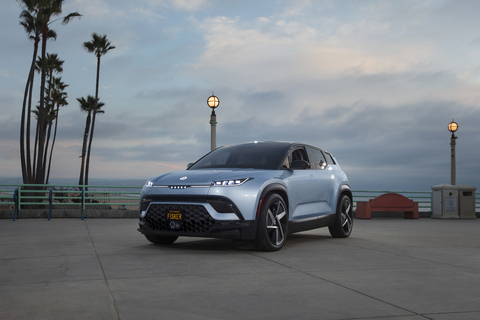Fisker Inc. Commits to United Nations Global Compact and Will Pursue Sustainable Development Goals
-
Fisker has signed the
UN Global Compact (UNGC) and is committed to supporting sustainable development goals and being an active participant with theUN . -
The company has published a Labor and Human Right policy, in alignment with the UNGC. Fisker joins businesses in over 160 countries that are advancing
UN objectives in human rights, labor, environment, and anti-corruption. -
Fisker CEO
Henrik Fisker , in a letter to theUN , expressed the importance of Environment, Social, and Governance (ESG) goals to the carmaker’s overall culture. -
The company took an ESG leadership position, aligned with the
UN Goals, prior to committing to theUN Global Compact , establishing strict social and environmental standards to create the world’s most sustainable vehicles. - In 2022, Fisker will produce the required Communication of Progress (COP) on the company’s efforts to support the Ten Principles of the UNGC.
-
Fisker has formed an ESG advisory council, with
UN Development Programme Goodwill AmbassadorNikolaj Coster-Waldau as its first external member.

The UNGC, established in 2000, is the world’s largest corporate sustainability initiative, according to the organization, uniting businesses in over 160 countries to support Ten Principles in areas of human rights, labor, the environment, and anti-corruption. (Additional detail on the Ten Principles can be found below.)
Shortly after going public, Fisker established a stringent framework for Environmental, Social, and Governance (ESG), including company-wide deliverables aligned with the
Signing on to the UNGC was a logical next step for Fisker as it pursues an overarching goal of creating the world’s most sustainable all-electric vehicles, starting with the Fisker Ocean SUV, arriving in late 2022. The company aims to produce a climate-neutral vehicle by 2027.
“ESG is a core value and brand pillar at Fisker,” wrote CEO
In a letter responding to Fisker’s stated intention to support the initiative, UNGC Executive Director
According to Ojiambo, “Such goals are critical for the health and vibrancy of the private sector given the symbiotic relationship between business and society.”
Ten Principles of the UNGC
The UNGC has articulated Ten Principles for the Global Compact, grouped into four areas:
Human Rights
Principles 1 &2: Businesses should support and respect the protection of internationally proclaimed human rights; and make sure that they are not complicit in human rights abuses.
Labor
Principles 3-6: Businesses should uphold the freedom of association and the effective recognition of the right to collective bargaining; the elimination of all forms of forced and compulsory labor; the effective abolition of child labor; and the elimination of discrimination in respect of employment and occupation.
Environment
Principles 7-9: Businesses should support a precautionary approach to environmental challenges; undertake initiatives to promote greater environmental responsibility; and encourage the development and diffusion of environmentally friendly technologies.
Anti-Corruption
Principle 10: Businesses should work against corruption in all its forms, including extortion and bribery.
Fisker Inc Was Built on ESG
Founded in 2016,
Thanks to this framework, Fisker intends to meet the UN’s requirement to produce a Communication of Progress (COP) on the company’s efforts to support the Ten Principles of the UNGC. The COP will be generated in 2022, documenting Fisker’s specific actions.
Within a few months of going public, Fisker established a publicly reported Responsible Supplier Policy and recently published its Labor and Human Rights Policy, among other important Governance material. The company has formed an
Renowned actor and
“We intend to lead our industry on sustainability and are ready to fulfill our commitments to the UNGC, advancing our ESG goals as we expand our company in the coming years,”
About
Forward-Looking Statements
This press release includes forward-looking statements, which are subject to the “safe harbor” provisions of the US Private Securities Litigation Reform Act of 1995. These statements may be identified by words such as “feel,” “believes,” expects,” “estimates,” “projects,” “intends,” “should,” “is to be,” or the negative of such terms, or other comparable terminology and include, among other things, the quotation of our Chief Executive Officer, and statements regarding the Company’s strategy and other future events that involve risks and uncertainties. Such forward-looking statements are not guarantees of future performance and are subject to risks and uncertainties, which could cause actual results to differ materially from the forward-looking statements contained herein due to many factors, including, but not limited to: Fisker’s limited operating history; Fisker’s ability to enter into additional manufacturing and other contracts with Magna, or other OEMs or tier-one suppliers in order to execute on its business plan; the risk that OEM and supply partners do not meet agreed upon timelines or experience capacity constraints; Fisker may experience significant delays in the design, manufacture, regulatory approval, launch and financing of its vehicles; Fisker’s ability to execute its business model, including market acceptance of its planned products and services; Fisker’s inability to retain key personnel and to hire additional personnel; competition in the electric vehicle market; Fisker’s inability to develop a sales distribution network; and the ability to protect its intellectual property rights; and those factors discussed in Fisker’s Annual Report on Form 10-K, as amended, under the heading “Risk Factors,” filed with the
View source version on businesswire.com: https://www.businesswire.com/news/home/20211215005169/en/
Tel: +1.310.374.6177
ssproule@fiskerinc.com
rlindland@fiskerinc.com
dgalves@fiskerinc.com
Source:







